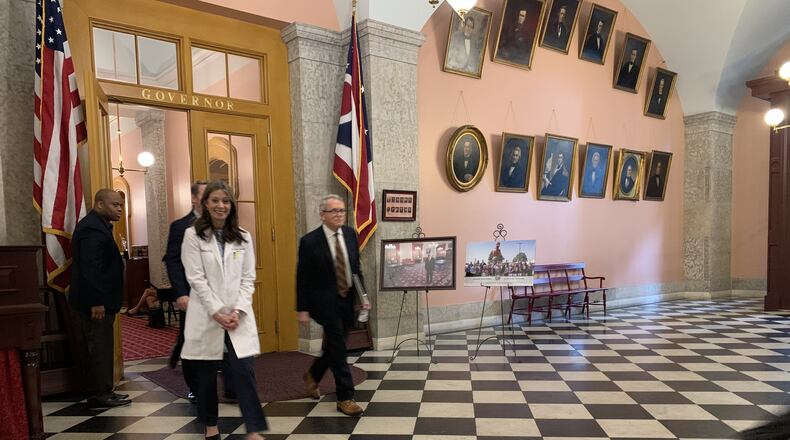“We will be having to build additional beds, just like you’re seeing in places like New York,” she said.
Coronavirus: Complete coverage
Gov. Mike DeWine added “We clearly do not have enough capacity as it exists today. That should surprise anyone.” The first preference is to use existing facilities for expanded hospital bed capacity, he said.
The number of confirmed coronavirus cases grew to 564 across 49 counties; 145 hospitalizations, including 62 in the ICU; and eight deaths. Patients range in age from infant to 95 years old.
Dr. Acton reported that 16% of the confirmed cases are health care workers, 25.7% of the cases are hospitalized and 11% are in ICUs.
Ohio’s numbers are lagging because of lower testing capacity. Ohio is on a steep upward trajectory similar to what is being seen in Italy and New York City, Dr. Acton said.
DeWine has moved aggressively to slow the coronavirus spread, closing schools, bars, restaurants, polling places, and non-essential businesses. He has warned Ohioans to be ready for the long-haul.
But President Donald Trump has said Americans to return to work, saying in a tweet on Tuesday: “The cure cannot be worse by far than the problem.”
DeWine said he is aligned with the president.
DeWine said he shares President Trump’s frustration and urge to get this over as fast as possible but the governor added, “The truth is that protecting people and protecting the economy are not mutually exclusive. In fact, one depends upon the other. The fact is we save our economy by first saving lives and we have to do it in that order.”
RELATED: Coronavirus stay-at-home order: What businesses are considered essential?
The short-term consequences of slowing the economy now to stop coronavirus far outweigh the “long-term economic meltdown from a deadly virus that is left unchecked. We cannot leave this unchecked,” he said.
State lawmakers are scheduled to return to Columbus on Wednesday to vote on emergency measures related to Ohio’s response to the coronavirus crisis, including waiving state mandated standardized testing requirements for K-12 schools, extending the state income tax filing deadline and establishing a new primary election date.
State Sen. Matt Huffman, R-Lima, introduced a bill Tuesday to extend mail-in voting to April 28.
The Ohio House announced extraordinary protocols to prevent the possible spread of coronavirus among lawmakers, journalists and others.
House members feeling unwell but insisting on attending will be quarantined in a members only lounge and the clerk will record their votes through the window. Members are directed to take their temperatures before attending session.
Lawmakers will be seated at least six-feet apart on the House floor and in the gallery, which is normally reserved for the public, and other lawmakers will be staged in satellite rooms in the Statehouse. Only essential staff will attend.
The press and public will be barred from attending the session — a rule currently being contested by the Ohio Legislative Correspondents Association.
Four members of the Georgia Senate tested positive for coronavirus and the entire state legislature there was urged to self-isolate.
MORE: Ohio nursing homes need child care, video chat tech, protective gear
U.S. Sen. Rob Portman, R-Cincinnati, authored a column in the Washington Post calling for the U.S. Senate to change its rules to allow for remote voting during a national crisis.
How to get help
The Ohio Department of Health is operating a help line at 833-4-ASK-ODH and website, coronavirus.ohio.gov, to answer questions. Links to the public health orders issued so far are available at that website.
About the Author


